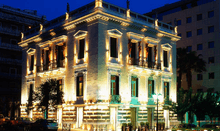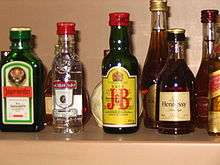Metaxa
|
| |
| Type | Greek liqueur |
|---|---|
| Country of origin | Athens, Greece |
| Introduced | 1888 |
| Variants | Metaxa 3 stars, Metaxa 5 stars, Metaxa 7 stars, Metaxa 12 stars, Metaxa Private Reserve, Metaxa AEN |
| Website | The official Metaxa website |
Metaxa (Greek: Μεταξά) is a Greek liqueur based on brandy blended with wine and flavorings. It is exported to over 65 countries.
History
The House of Metaxa was founded by a Greek merchant and entrepreneur named Spyros Metaxas, born on the island of Euboea.[1] The name "Metaxas" means "silk merchant".[2] He created the first Greek brandy and was involved in the foundation of the first distillation facility in 1888, a little over 50 years after the Greek War of Independence. The business soon expanded with new factories in Istanbul and Odessa. In 1900 the first exports to the United States took place and the drink became known as "the flying brandy".

Following Spyros Metaxas's death, his sons carried on his work. In 1968 a new factory was built in Kifissia, Athens.
Metaxa is not only one of just two Greek industries that survived both World Wars but both were founded in the curious year of 1888; the other is Karelia Fine Tobaccos SA, the one and only to be still 100% under its original & founding Greek family.
The label shows a Salamina Warrior, a figure on an ancient Greek trireme that was carved on a coin of that period, found during the excavation of the first factory in Piraeus in 1888.
The House of Metaxa has won several gold medals in international spirit competitions. In 1989 the company was bought by the British drinks group Grand Metropolitan (now called Diageo) and was later sold to the Rémy Cointreau group.[3]
Creation
“Metaxa starts out like a brandy, with a variety of distillates made from dry white wines from different parts of Greece. After periods of ageing in oak casks, the distillates are blended and mixed with a small amount of rich muscat wine from the Greek Aegean Islands of Samos and Lemnos. Finally, Mediterranean herb and floral extracts are added – a secret recipe apart from rose petals.”[4]
Metaxa's smoothness comes from its Muscat wine. The resulting distillates are kept in cellars, in limousin French oak barrels. French barrels are considered more desirable than those made in North America since French Oak has smaller pores than its American counterpart. This slows the transfer of flavour between the barrel and the liquor contained within.
See also
References
- ↑ Το «Μεταξά» που κατέκτησε την υφήλιο (Greek)
- ↑ Andriotis et al., Λεξικό της Κοινής Νεοελληνικής
- ↑ Remy Cointreau: Liqueurs and Spirits. remy-cointreau.com
- ↑ Tod Stewart, "Lured", Quench by tidingsmag.com, February/March 2013, p. 28
External links
| Wikimedia Commons has media related to Metaxa. |


